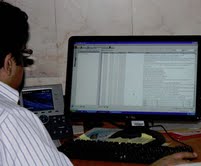Republished from FrontlineSMS:Radio Guest Post By Zydrone Krasauskiene, Editorial Manager, Radio Free Europe/Radio Liberty
FrontlineSMS software has opened up new frontiers for Radio Mashaal -literally- by creating a completely new and unorthodox way of making interactivity possible for Pashto-speaking audiences in the border region between Pakistan and Afghanistan.
Radio Free Europe/Radio Liberty (RFE/RL) reports the news where a free press does not exist or is not allowed by the government. RFE/RL reaches nearly 25 million people in 28 languages and 21 countries in Russia, the Middle East, and Central and South Asia. One of RFE/RL's newest services, Radio Mashaal was launched in 2010 and provides reporting in Pashto language in Pakistan's Khyber-Pakhtunkhwa Province, the Federally Administered Tribal Areas (FATA) and part of Balochistan province. Until now the huge cost of calling the RFE/RL Prague headquarters prevented our listeners in Afghanistan and Pakistan from contributing to our programming.
I first heard about the FrontlineSMS open source software, which can turn any computer into an SMS hub, at the Online News Association conference in Washington DC last September. Then when I was in London in April, I visited the FrontlineSMS office and during a chat with Amy O'Donnell the Radio Project Manager, I asked whether we could try it out here at RFE/RL. Our Mashaal colleagues used to experience great difficulties in engaging their listeners because they found that it was too expensive for them to call in. So an SMS service looked like a promising solution.
After consulting with my colleagues, we installed FrontlineSMS software in our bureau in Islamabad and connected it to a GSM modem. Colleagues in Islamabad arranged to use a local SIM card and negotiated an extremely reasonable package with the local network provider connection, the subscription cost $1.75 per month including 10,000 SMS messages.
All was set, and on May 11, 2011 Radio Mashaal announced its phone number and invited listeners to contact moderators and program makers.
The response was overwhelming. On the first day, over 130 text messages were received containing political comments, pieces of poetry and praise for Mashaal programs. They even received some jokes via text! While we currently broadcast 9 hours daily, some of the listeners asked for an increase of Mashaal daily programming to 24 hours. In just six months, we received over 20,000 messages.
As a colleague from Radio Mashaal, Shaheen Buneeri explained, “The SMS facility has created an excellent opportunity for Radio Mashaal listeners to express their thoughts and feelings on social, political, cultural and security issues in the region. Through these messages, which are an important part of our news bulletins, listeners connect to their dear ones in foreign lands, and the Pashto diaspora shares messages of peace and goodwill with their friends and families at home.”
But even more than that, some incoming SMSs contained information that turned into reports. For example, about two months ago someone sent an SMS to Radio Mashaal from the Kacaha Panga area near Hango, complaining that although they lived very close to a gas distribution station, they had been disconnected from the main gas supply. The issue was taken up by producer Stonzi Aow Sarkar of Radio Mashaal, who challenged the relevant authorities to find a solution. The authorities promised to solve the problem. Similarly, Radio Mashaal received messages in August 2011 about the shortage of water and electricity in Pakistan's Balochistan province. Radio Mashaal correspondents checked the situation on the ground and found that it was true. A local reporter was tasked to take the issue to the relevant authorities. He did so and filed a report on it, creating widespread interest in the issue.
This SMS project has established an extremely effective communication channel for Radio Mashaal listeners. The only drawback is that because of the huge amount of incoming SMSs, we are unable to send SMS replies to all of our listeners. But as Mudaqiq Amin, Radio Mashaal director says, “The most important thing is that the SMS service enabled our listeners, even the poorest of them, to contact us.”
More than 3 million Pashtuns live in the FATA region. According to last year’s audience research, Radio Mashaal's weekly reach in this region is 5.9 percent of the Pashto population. This demonstrates the power of radio in communicating with this community and the increasing need to offer platforms to allow listeners to engage with the station.
To quote just one SMS which came in last week, in English, “Mashaal Radio is 1 of the best radio [station] in the world!” Isn’t it rewarding?
This post was republished from FrontlineSMS:Radio. If you are interested in the combination of radio and SMS check out radio.frontlinesms.com


